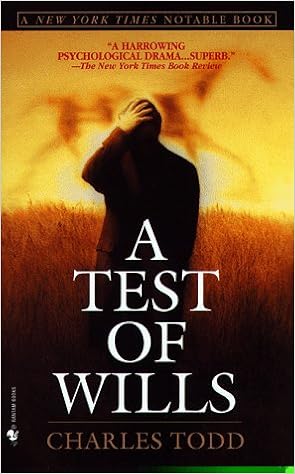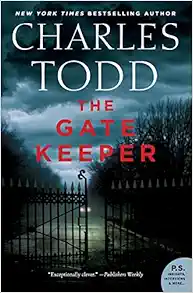
Description
From the Publisher A New York Times Book Review Notable Book. "A harrowing psychological drama...Superb." --The New York Times Book Review "Remarkable." --Chicago Tribune "Todd has written a first novel that speaks out, urgently and compassionately, for a long-dead generation and a world he never knew....A meticulously wrought puzzle." --The New York Times Book Review "Remarkable...Todd, an American, seems to have perfect pitch in his ability to capture the tenor and nuances of English country life." --The Kansas City Star "Unusual...finely crafted...psychologically sophisticated, tautly written and craftily plotted." --San Jose Mercury News From the Inside Flap It's 1919, and the War to End All Wars has been won. But for Scotland Yard Inspector Ian Rutledge, recently returned from the battlefields of France, there is no peace. Suffering from shell shock, tormented by the mocking, ever-present voice of the young Scot he had executed for refusing to fight, Rutledge plunges into his work to save his sanity. But his first assignment is a case certain to spell disaster, personally and professionally.In Warwickshire, a popular colonel has been murdered, and the main suspect is a decorated war hero and close friend of the Prince of Wales. The case is a political minefield, and no matter what the outcome, Rutledge may not escape with his career intact. But, win or lose, the cost could be even higher: the one witness who could break the case is himself a shell shock victim, teetering on the edge of reality. And in this war-ravaged man, Rutledge sees his own possible future, should he lose grip on his mind.... Excerpt. © Reprinted by permission. All rights reserved. In this quiet part of Warwickshire death came as frequently as it did anywhere else in England, no stranger to the inhabitants of towns, villages, or countryside.xa0xa0Sons and fathers had died in the Great War; the terrible influenza epidemic had scythed the county--man, woman, and child--just as it had cut down much of Europe; and murder was not unheard of even here in Upper Streetham.But one fine June morning, as the early mists rose lazily in the warm sunlight like wraiths in no hurry to be gone, Colonel Harris was killed in cold blood in a meadow fringed with buttercups and cowslips, and his last coherent thought was anger.xa0xa0Savage, wild, black fury ripped through him in one stark instant of realization before oblivion swept it all away, and his body, rigid with it, survived the shotgun blast long enough to dig spurs into the mare's flanks while his hands clenched the reins in a muscular spasm as strong as iron.He died hard, unwilling, railing at God, and his ragged cry raised echoes in the quiet woods and sent the rooks flying even as the gun roared. * * * In London, where rain dripped from eaves and ran black in the gutters, a man named Bowles, who had never heard of Colonel Harris, came into possession of a piece of information that was the reward of very determined and quite secret probing into the history of a fellow policeman at Scotland Yard.He sat at his desk in the grim old brick building and stared at the letter on his blotter.xa0xa0It was written on cheap stationery in heavy ink by a rounded, rather childish hand, but he was almost afraid to touch it.xa0xa0Its value to him was beyond price, and if he had begged whatever gods he believed in to give him the kind of weapon he craved, they couldn't have managed anything sweeter than this.He smiled, delight spreading slowly across his fair-skinned face and narrowing the hard, amber-colored eyes.If this was true--and he had every reason to believe it was--he had been absolutely right about Ian Rutledge.xa0xa0He, Bowles, was vindicated by six lines of unwittingly damaging girlish scrawl.Reading the letter for the last time, he refolded it carefully and replaced it in its envelope, locking it in his desk drawer.Now the question was how best to make use of this bit of knowledge without burning himself in the fire he wanted to raise.If only those same gods had thought to provide a way .xa0xa0.xa0xa0.But it seemed, after all, that they had.Twenty-four hours later, the request for assistance arrived from Warwickshire, and Superintendent Bowles happened, by the merest chance, to be in the right place at the right time to make a simple, apparently constructive suggestion.xa0xa0The gods had been very generous indeed.xa0xa0Bowles was immensely grateful.The request for Scotland Yard's help had arrived through the proper channels, couched in the usual terms.xa0xa0What lay behind the formal wording was sheer panic.The local police force, stunned by Colonel Harris's vicious murder, had done their best to conduct the investigation quickly and efficiently.xa0xa0But when the statement of one particular witness was taken down and Inspector Forrest understood just where it was going to lead him, the Upper Streetham Constabulary collectively got cold feet.At a circumspect conference with higher county authority, it was prudently decided to let Scotland Yard handle this situation--and to stay out of the Yard's way as much as humanly possible.xa0xa0Here was one occasion when metropolitan interference in local police affairs was heartily welcomed.xa0xa0With undisguised relief, Inspector Forrest forwarded his request to London.The Yard in its turn faced a serious dilemma.xa0xa0Willy-nilly, they were saddled with a case where discretion, background, and experience were essential.xa0xa0At the same time, it was going to be a nasty one either way you looked at it, and someone's head was bound to roll.xa0xa0Therefore the man sent to Warwickshire must be considered expendable, however good he might be at his job.And that was when Bowles had made his timely comments.Inspector Rutledge had just returned to the Yard after covering himself with mud and glory in the trenches of France.xa0xa0Surely choosing him would be popular in Warwickshire, under the circumstances--showed a certain sensitivity for county feelings, as it were.xa0xa0.xa0xa0.xa0xa0.xa0xa0As for experience, he'd handled a number of serious cases before the war, he'd left a brilliant record behind him, in fact.xa0xa0The word scapegoat wasn't mentioned, but Bowles delicately pointed out that it might be less disruptive to morale to lose--if indeed it should come to that--a man who'd just rejoined the force.xa0xa0Please God, of course, such a sacrifice wouldn't be required! A half-hearted quibble was raised about Rutledge's state of health.xa0xa0Bowles brushed that aside.xa0xa0The doctors had pronounced him fit to resume his duties, hadn't they? And although he was still drawn and thin, he appeared to be much the same man who had left in 1914.xa0xa0Older and quieter naturally, but that was to be expected.xa0xa0A pity about the war.xa0xa0It had changed so many lives.xa0xa0.xa0xa0.xa0xa0.The recommendation was approved, and an elated Bowles was sent to brief Rutledge.xa0xa0After tracking the Inspector to the small, drafty cubicle where he was reading through a stack of reports on current cases, Bowles stood in the passage for several minutes, steadying his breathing, willing himself to composure.xa0xa0Then he opened the door and walked in.xa0xa0The man behind the desk looked up, a smile transforming his thin, pale face, bringing life to the tired eyes."The war hasn't improved human nature, has it?" He flicked a finger across the open file on his blotter and added, "That's the fifth knifing in a pub brawl I've read this morning.xa0xa0But it seems the Army did manage to teach us something--exactly where to place the blade in the ribs for best results.xa0xa0None of the five survived.xa0xa0If we'd done as well in France, bayoneting Germans, we'd have been home by 1916."His voice was pleasant, well modulated.xa0xa0It was one of the things that Bowles, with his high-pitched, North Country accent, disliked most about the man.xa0xa0And the fact that his father had been a barrister, not a poor miner.xa0xa0Schooling had come easily to Rutledge.xa0xa0He hadn't had to plod, dragging each bit of knowledge into his brain by sheer effort of will, dreading examinations, knowing himself a mediocrity.xa0xa0It rubbed a man's pride to the bone to struggle so hard where others soared on the worldly coattails of London-bred fathers and grandfathers.xa0xa0Blood told.xa0xa0It always had.xa0xa0Bowles passionately resented it.xa0xa0If there'd been any justice, a German bayonet would have finished this soldier along with the rest of them!"Yes, well, you can put those away, Michaelson's got something for you," Bowles announced, busily framing sentences in his mind that would convey the bare facts and leave out the nuances that might put Rutledge on his guard, or give him an opening to refuse to go to Warwickshire.xa0xa0"First month back, and you've landed this one.xa0xa0You'll have your picture in the bloody papers before it's done, mark my words." He sat down and began affably to outline the situation. Read more
Features & Highlights
- It's 1919, and the War to End All Wars has been won. But for Scotland Yard Inspector Ian Rutledge, recently returned from the battlefields of France, there is no peace. Suffering from shell shock, tormented by the mocking, ever-present voice of the young Scot he had executed for refusing to fight, Rutledge plunges into his work to save his sanity. But his first assignment is a case certain to spell disaster, personally and professionally.In Warwickshire, a popular colonel has been murdered, and the main suspect is a decorated war hero and close friend of the Prince of Wales. The case is a political minefield, and no matter what the outcome, Rutledge may not escape with his career intact. But, win or lose, the cost could be even higher: the one witness who could break the case is himself a shell shock victim, teetering on the edge of reality. And in this war-ravaged man, Rutledge sees his own possible future, should he lose grip on his mind....





